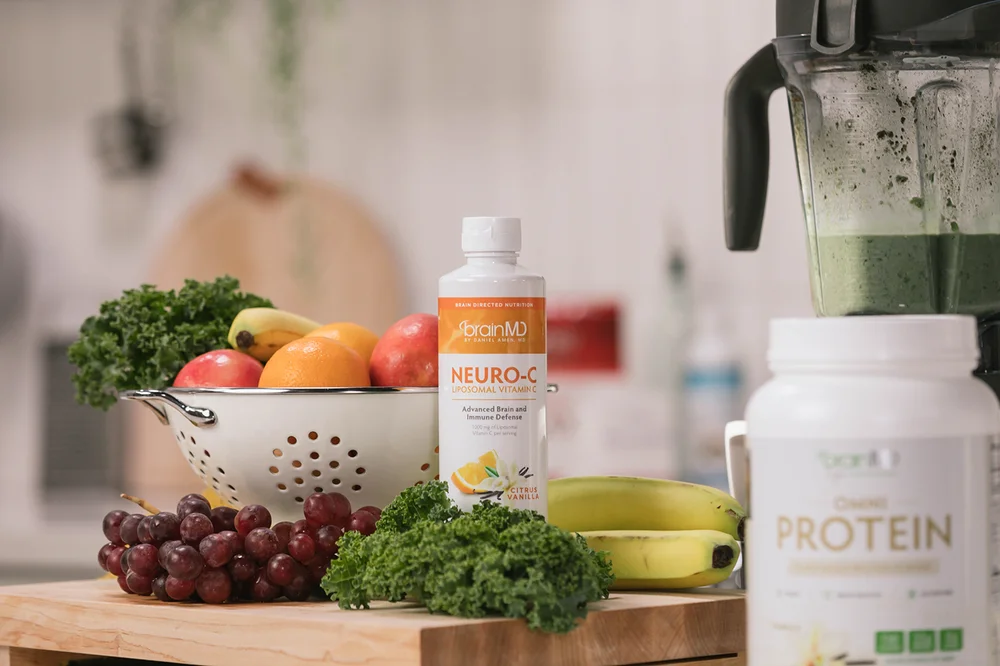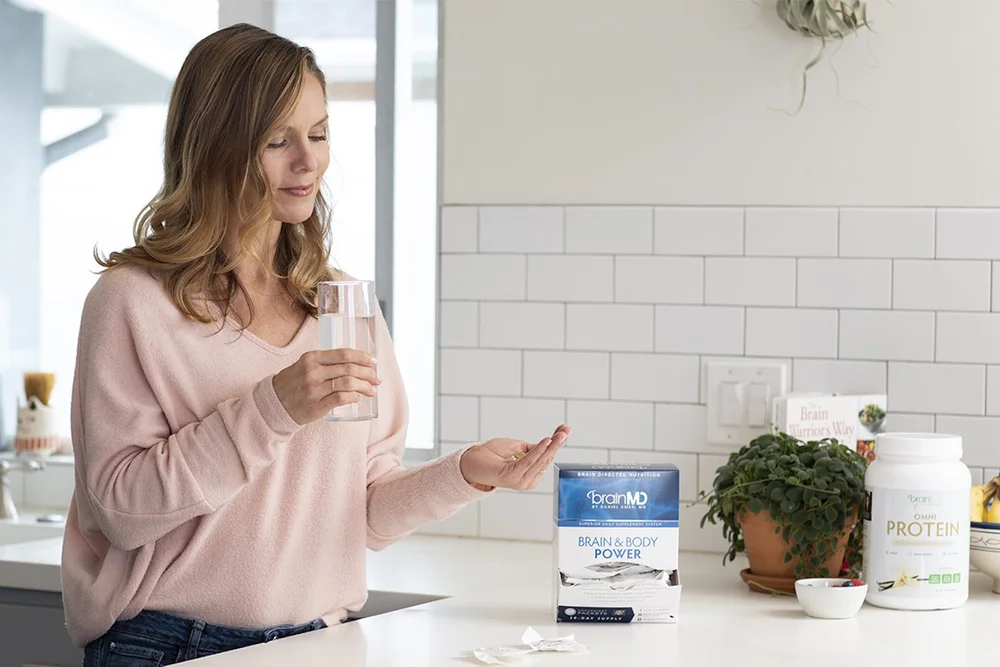Here Are 3 of the Top Reasons to Take Liquid Vitamin C
Medically Reviewed by Dr. Nicole Avena
Do you take a vitamin C supplement every day?
If not, here’s why you should…
Importance of Vitamin C
Vitamin C is essential for human life. The body needs it but can’t make it, so we must get it from our diet. However, U.S. Government surveys indicate a substantial percentage of Americans aren’t getting adequate amounts of vitamin C.
Vitamin C is the best-studied and understood antioxidant: a substance that readily donates electrons to neutralize potentially damaging oxidative free radicals. When our cells use oxygen to make energy, they create free radicals, which can destroy DNA, proteins, and other key cell components. As one of our major natural antioxidant protectors, vitamin C helps to defend against free radicals and the many toxins that can enter the body via the air, water, or foods.
As an essential vitamin, C is involved in immune support, collagen production, and plays a key role in brain health. For these, and many other reasons, it’s important to take a vitamin C supplement every day.
But how can you know if you’re getting a quality vitamin C product?
The Problem with Many Vitamin C Supplements
Sadly, when it comes to vitamin C supplements, many fail to provide what they promise. Some have inferior ingredients. Others are poorly absorbed. Still others contain lower amounts of the vitamin than what’s recommended for daily intake.
Also, most vitamin C supplements contain ascorbic acid, a water-soluble form of vitamin C that exits the body quickly (yellow urine may be an indication of this).
At lower doses (30-180 mg a day), 70% to 90% of ascorbic acid is absorbed. But at higher doses (1,000 mg+ a day), absorption drops to less than 50%. This makes it difficult to get the necessary amount of this vital vitamin every day.
Since absorption is such a major consideration when taking vitamin C, many have looked for alternatives to taking vitamin C tablets or capsules. One delivery method that seems to have better absorption of vitamin C is the liposomal, or liquid, form of the vitamin.
3 Benefits of Liquid Vitamin C
Here are 3 of the top benefits of taking liposomal vitamin C.
- Easily Absorbed
Liposomal vitamin C is enclosed in bubbles called liposomes, which protect it from degradation by stomach acid. Liposomes, tiny fats called phospholipids, are similar to cell membranes. These liposomes readily enter your cells, which can increase the amount of C you absorb.*
- Gentle on the Stomach
Compared to other forms of high-dose vitamin C, liposomal vitamin C is less likely to cause upset stomach.*
- Clinically Researched
Research has found that liposomal vitamin C achieves higher levels of vitamin C in the blood and white blood cells than ascorbic acid.*
Recommended Daily C
Recently, the recommended Daily Value for intake of vitamin C was raised to 90 mg per day. Unless you have a well-balanced diet rich in vitamin C-rich vegetables and citrus fruits, you may be at risk of not obtaining sufficient vitamin C.
So, how can you ensure that you’re getting enough of this essential nutrient?
To protect against vitamin C deficiency, and to fuel better brain health, neurotransmitter production, and antioxidant defense, try BrainMD’s Neuro-C Liposomal Vitamin C.
BrainMD’s Neuro-C Liposomal Vitamin C
This breakthrough nutraceutical formula was scientifically designed to promote advanced brain and immune defense. A versatile and powerful nutrient, vitamin C is crucial for immunity, circulation, skin quality, peak mental performance, and overall well-being.*
Neuro-C delivers vitamin C more efficiently than tablets, capsules, or powders.* This liquid vitamin C contains a special, lipid-soluble form of vitamin C that stays in the body longer than ascorbic acid, so it’s well-absorbed at higher doses.*
6 Benefits of Vitamin C Supplements
Several important human enzymes need vitamin C to function. This is most evident in the brain, where C is more highly concentrated than in any other organ.
Our nerve cells need C to make the neurotransmitters dopamine and norepinephrine, along with carnitine, creatine, tyrosine, and the myelin that electrically insulates the nerve cells. Vitamin C is vital for enzymes that make collagen, which is essential for strengthening the walls of the brain’s blood vessels.
- The Collagen Connection
Collagen is a family of large proteins that provide strength to the body’s connective tissues. Collagen is a major structural component of this connective tissue “glue” that holds our cells in their assigned locations within our tissues and organs. The body needs vitamin C to make collagen for healthy circulation, skin, joints, bone and other hard tissues, and all the body’s organs.
- C is for Circulation
The body’s miles of blood vessels need vitamin C to maintain the collagen that builds the structure of their walls. Sufficient availability of C helps the blood vessels maintain their strength and functional flexibility.
The circulating blood relies on vitamin C for its antioxidant, anti-free radical capacity. Immune cells that circulate with the blood are particularly reliant on C.
- Added Immune Protection
Much of our immune system consists of mobile single cells that circulate with the blood or patrol our tissues looking for hostile invaders. These cells need high levels of vitamin C to power their movements, but without enough C, they may be unable to perform their task.
Also, many of the circulating immune cells produce highly toxic free radicals to destroy bacteria, viruses, or other harmful agents and need internal C to protect them against self-destruction. The solid tissues of the immune system also need C for optimal function.
- Adrenal Gland Support
The adrenals are small glands positioned like caps on each of our kidneys and are loaded with vitamin C. They make much of the body’s necessary steroid hormones, as well as hormones important for managing stress, and both these functions depend on enzymes that require vitamin C. By supporting the adrenals’ key life-sustaining functions, vitamin C is a major asset against stress.
- Increasing Blood Vitamin C with Liposomes
Liposomes are tiny molecular spheres with hollow interiors, and outer shells made of phospholipids like those that make up our cell membranes. The hollow interior can be loaded with a substance that isn’t normally well absorbed – in this case, vitamin C – then made into a dietary supplement ingredient.
When Neuro-C is taken by mouth, its liposomes help protect their loads of vitamin C molecules from being broken down by the acidity of the stomach.* After the liposomes reach the intestine, their shells are dissolved by digestive enzymes. This releases the vitamin C molecules to be absorbed across the intestinal wall and into the bloodstream.
The specific liposomes used in BrainMD’s Neuro-C were shown to be an effective molecular vehicle for increasing vitamin C levels in the blood.*
Here’s What Others Are Saying About Neuro-C:
“This is like drinking a creamscile! I love it.” -Barbara L.
“I take it daily. Love the taste and feeling like I have more energy and skin is more vibrant and youthful.” -Michelle M.
If you want to get more vitamin C to boost your immunity but you’re struggling with pill fatigue, Neuro-C is for you. It’s a liquid that’s more powerful than a capsule. And it tastes great—like sunshine in a bottle.” -Daniel G. Amen, MD
C the Difference
Getting adequate amounts of vitamin C every day is a great way to improve overall brain and body health.
Neuro-C Liposomal Vitamin C supplies 1,000 mg of vitamin C in a form that’s conveniently drinkable, highly absorbable, and easy on the stomach.*
Support your immune system, circulation, adrenal glands, collagen production, and total well-being with BrainMD’s Neuro-C Liposomal Vitamin C.*
Try it today!
At BrainMD, we’re dedicated to providing the highest purity nutrients to improve your physical health and overall well-being. For more information about our full list of brain healthy supplements, please visit us at BrainMD.




